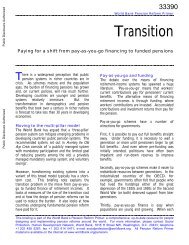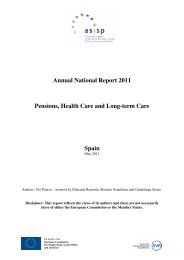Financial Sector Development in Africa: Opportunities ... - World Bank
Financial Sector Development in Africa: Opportunities ... - World Bank
Financial Sector Development in Africa: Opportunities ... - World Bank
You also want an ePaper? Increase the reach of your titles
YUMPU automatically turns print PDFs into web optimized ePapers that Google loves.
Hous<strong>in</strong>g F<strong>in</strong>ance 145<br />
of the impact of extend<strong>in</strong>g the terms of mortgage loans and the impact<br />
on affordability. By reduc<strong>in</strong>g <strong>in</strong>flation expectations, the implied discount<br />
rate falls. This drop has the double benefit of reduc<strong>in</strong>g the rate of <strong>in</strong>terest<br />
and mak<strong>in</strong>g it economically viable to discount a loan over a longer<br />
period.<br />
Across much of <strong>Africa</strong>, <strong>in</strong>terest rates are often <strong>in</strong> the range of 10 to 15<br />
percent; at these levels, there is little benefit <strong>in</strong> extend<strong>in</strong>g mortgage terms<br />
beyond 10 years. This automatically puts a severe constra<strong>in</strong>t on<br />
affordability.<br />
It is no co<strong>in</strong>cidence that the two most successful hous<strong>in</strong>g f<strong>in</strong>ance markets<br />
<strong>in</strong> <strong>Africa</strong> are Morocco and South <strong>Africa</strong>, both of which have benefited<br />
from strong macroeconomic <strong>in</strong>dicators that make long-term f<strong>in</strong>ance<br />
favorable.<br />
Another key macro variable that should be subject to much greater<br />
scrut<strong>in</strong>y <strong>in</strong> the countries of <strong>Africa</strong> is the price of real estate. Real estate<br />
price bubbles can destroy mortgage markets and set back efforts to<br />
develop hous<strong>in</strong>g f<strong>in</strong>ance. The bubbles may be caused by speculation on<br />
land or real estate and may be fueled by a credit expansion. Whatever the<br />
causes, the monetary authorities need access to the data and <strong>in</strong>formation<br />
as early as possible so they can take corrective action. In <strong>Africa</strong>n countries<br />
where the supply of hous<strong>in</strong>g may be limited, together with limited price<br />
elasticity of supply, any <strong>in</strong>crease <strong>in</strong> credit can rapidly result <strong>in</strong> house price<br />
<strong>in</strong>flation.<br />
Key macroeconomic management recommendations (to the extent<br />
that they directly impact hous<strong>in</strong>g f<strong>in</strong>ance) are as follows:<br />
• Manage <strong>in</strong>flation and <strong>in</strong>flation expectations. Inflation <strong>in</strong>creases the cost<br />
of long-term money and does more to constra<strong>in</strong> affordability than<br />
almost any other s<strong>in</strong>gle factor.<br />
• Develop fixed <strong>in</strong>come markets. Consider the role of government <strong>in</strong> foster<strong>in</strong>g<br />
the development of fixed <strong>in</strong>come markets through its debt management<br />
policy. A yield curve can be constructed through the strategic<br />
issuance of benchmark bonds at different maturities. A regular debt<br />
issuance program is needed to ma<strong>in</strong>ta<strong>in</strong> liquidity and secondary trad<strong>in</strong>g.<br />
The yield curve allows for improved pric<strong>in</strong>g and transparency <strong>in</strong> longterm<br />
f<strong>in</strong>anc<strong>in</strong>g.<br />
• Actively monitor real estate prices for residential and commercial property.<br />
Together with bank exposures to real estate, such monitor<strong>in</strong>g can







